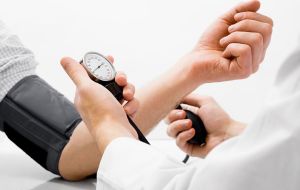MercoPress. South Atlantic News Agency
Five cups of coffee a day good for the heart and to combat diabetes, says 10-year study
 The 10-year study found that the more coffee people drank, the less likely they were to die early. Results were similar with people who drank decaffeinated coffee.
The 10-year study found that the more coffee people drank, the less likely they were to die early. Results were similar with people who drank decaffeinated coffee.  Despite caffeine’s stimulant qualities, it is unlikely to cause a problem for most people, but is not recommended for people with blood pressure
Despite caffeine’s stimulant qualities, it is unlikely to cause a problem for most people, but is not recommended for people with blood pressure A major US study has found that people who drink up to five cups of coffee daily are less likely to die from health issues such as heart disease and diabetes compared to those who don’t drink coffee at all. The 10-year study found that the more coffee people drank, the less likely they were to die early. The results were similar with people who drank decaffeinated coffee.
The Huffington Post reports that researchers studied data of 90,317 adults who did not have cancer or a history of heart disease.
The subjects’ lifestyle habits were monitored between 1998 and 2009. The data included coffee intake as well as other dietary and health information.
By 2009, roughly 8,700 people had died and, after taking into account other lifestyle factors such as smoking and heavy alcohol consumption, the researchers determined that those who drank coffee had a lower risk of death than those who did not.
People who drank between four and five cups daily were least likely to die from heart disease, diabetes, chronic respiratory diseases, pneumonia, influenza and suicide.
Although other recent studies have included cancer in the list, the latest study did not.
Dr Erikka Loftfield of the National Cancer Institute in Rockville, Maryland said that: “although coffee drinking has also been inversely associated with incidence of certain cancers, like liver [cancer], in epidemiological studies, we did not observe an association between coffee and overall cancer mortality.
“This may be because coffee reduces mortality risk for some cancers but not others,” she noted.
The study, which was published in the American Journal of Epidemiology, was not the first to link coffee with a reduced risk of death. In November, a study suggested that drinking three to five cups of coffee a day could reduce the risk of premature death from serious illness.
Other recent studies have suggested that regular coffee drinkers are at lower risk of developing Parkinson’s disease, and have a better chance of losing weight and keeping it off.
Professor Clare Collins of the Dieticians Association of Australia told the Australian edition of Good Food magazine: “When you look at the biochemical role of coffee, it seems to have a task at a cellular level that I would explain is a bit like a contract cleaner: it’s able to come in and speed up some important biochemical processes related to fixing damage in cells or clearing away debris so that some of the molecules related to insulin and glucose can work more efficiently.”
Despite caffeine’s stimulant qualities, it is unlikely to cause a problem for most people, but is not recommended for people with conditions in which a short-term increase in heart rate and blood pressure might stress the heart.
Caffeine is the world’s most widely consumed stimulant and reports show it can boost daily energy expenditure by around five per cent.




Top Comments
Disclaimer & comment rules-

-

-

Read all commentsl'll drink to that. l love coffee!
Jan 12th, 2016 - 09:22 am 0I love coffee too, but I think it is more to do with coffee making them get off their ass and go to work instead of being a couch potato.
Jan 12th, 2016 - 01:51 pm 0If the experts say its good,
Jan 12th, 2016 - 02:40 pm 0one should just drink water,
remember sausages and all that meat,
win [red] cheese.
all good in one study,
then the next thing you know, it too is linked with the dreaded [C]
personally I drink tea, and hope for the best, Gulp! .
Commenting for this story is now closed.
If you have a Facebook account, become a fan and comment on our Facebook Page!